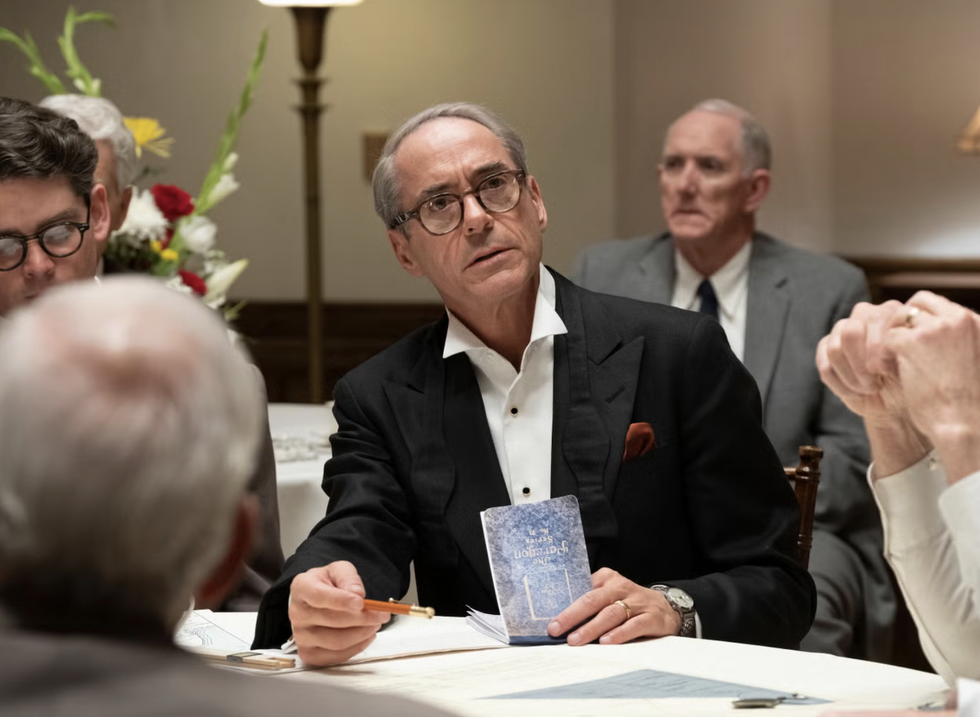Christopher Nolan's Oppenheimer, the three-hour epic chronicling the invention of the nuclear bomb and its aftermath, features a virtuosic performance from Cillian Murphy and focuses largely on his titular scientist as he grapples with the ramifications of his own hubris. Supporting Murphy is an all-star cast of actors portraying real-life figures from that time period, including Emily Blunt as Oppenheimer's wife Kitty, Florence Pugh as his lover Jean Tatlock, and Gary Oldman as U.S. President Harry Truman.
Especially pivotal to the film's third act is former MCU star Robert Downey Jr., who plays Lewis Strauss, a member of the Atomic Energy Commission (AEC) and an increasingly antagonistic party in the security hearings that ultimately result in Oppenheimer's clearance being revoked.
As the film tells it, Strauss is initially driven by professional jealousy and resentment towards Oppenheimer, as well as a degree of perceived humiliation: he believes Oppenheimer "badmouthed" him to renowned physicist Albert Einstein (Tom Conti).
And while some of the enmity between the two men may be narrativized and played for dramatic effect, the details of Strauss' vendetta against Oppenheimer are based in well-documented facts.
Who was Lewis Strauss?
As a founding member of the AEC, Strauss played an instrumental role in the development of nuclear weapons and energy in the United States during the Cold War. However, while Strauss was a supporter of research into the creation of the hydrogen bomb, which J. Robert Oppenheimer vehemently opposed due to his own guilt following the destruction at Hiroshima.
Strauss' grudge against J. Robert Oppenheimer is believed to have worsened in 1947, when the physicist was offered a job as director at Princeton's Institute for Advanced Study—a position for which Strauss had momentarily been considered. He also disliked Oppenheimer on personal and political grounds: Oppenheimer was a liberal who associated with Communists and spoke seldom of his Jewish heritage, while Strauss was a Republican, sat on the American Jewish Committee, and had attempted (unsuccessfully) to influence U.S. policy to increase the number of refugees allowed into the country during the Holocaust.
These resentments culminated in Strauss arranging for Oppenheimer to be stripped of his security clearance following the 1954 hearings—just one day before they had been due to expire, seemingly confirming that his primary intention had been to humiliate and discredit Oppenheimer.
In an interview with Vulture prior to the release of Oppenheimer, Downey shared his thoughts on Strauss and offered an alternative take on the man, who is presented in stark antagonism to Murphy's Oppenheimer.
"I had a previous fair understanding of Strauss because I was fascinated with the mechanics of warfare, particularly in the Pacific theater in World War II," he said. "I challenged a little bit the Mozart-Salieri of it all. I said, I’m not sure in some ways that Strauss isn’t a bit the hero here, which kind of raised an eyebrow on Chris [Nolan]. I half-jokingly challenged him on whether Admiral Strauss hadn’t done everything that any patriotic American would’ve done. And he said, Well, this will be a wonderful ongoing dialogue."

Philip Ellis is News Editor at Men's Health, covering fitness, pop culture, sex and relationships, and LGBTQ+ issues. His work has appeared in GQ, Teen Vogue, Man Repeller and MTV, and he is the author of Love & Other Scams.
"story" - Google News
July 29, 2023 at 05:15AM
https://ift.tt/sH5ZVPk
The True Story of Lewis Strauss' Rivalry With J. Robert Oppenheimer - Men's Health
"story" - Google News
https://ift.tt/bIRMsXD
https://ift.tt/Qq3sTjJ
Bagikan Berita Ini















0 Response to "The True Story of Lewis Strauss' Rivalry With J. Robert Oppenheimer - Men's Health"
Post a Comment